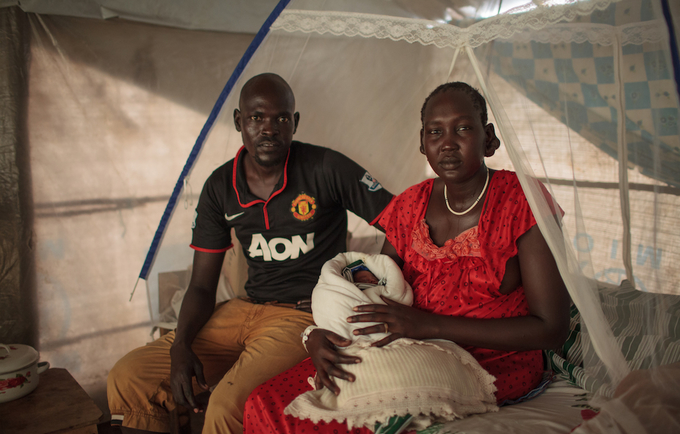JOHANNESBURG, South Africa—The 25th anniversary of ICPD is an opportunity to reflect on the road traversed, to strengthen resolve, and for renewal and revitalization, said Dr. Nkosazana Dlamini-Zuma, Minister in the Presidency, South Africa: Planning, Monitoring and Evaluation.
She was speaking at a leadership dinner held by UNFPA to celebrate 25 years of the International Conference on Population and Development (ICPD), in Johannesburg, South Africa, on 25 February.

Southern Africa, with Gogontlejang Phaladi (far left), African Youth
and Adolescent Network (AfriYAN) member; Dr. Nkosazana Dlamini-
Zuma, Minister in the Presidency, South Africa; and Dr. Gertrude
Mongella (right), former president of the Pan-African Parliament and
Special Advisor to the ECAExecutive Secretary (right).
© UNFPA ESARO
“UNFPA has become the foremost multilateral institution for population and reproductive rights. We have relied on UNFPA funds and technical expertise to address our key population challenges, such as HIV and AIDs, as well as family planning, maternal health and issues related to sexuality and sexuality education,” she said.
While these contributions are well noted, much more needs to be done to secure basic human rights, especially the right to development, she stressed.
As the bottom 50 per cent of people globally earn less than 10 per cent of the world’s wealth, the challenge is not plans and agreements but transformative actions that link all facets of people’s development.
“We are therefore encouraged that one of the goal’s of UNFPA’s renewal and revitalization of commitment is to end unmet need for family planning,” she said. Some 214 million women who want to plan their births do not have access to modern family planning.
“We must do more to promote universal access to quality and integrated sexual and reproductive rights and services,” she urged. This is particularly so because “some of the world’s leaders and conservative societies have regressed and frowned upon these important and fundamental rights.”
The right to health must be asserted. “We therefore support the UNFPA goal of bringing to zero the number of maternal deaths, and we note the progress made in reducing maternal mortality by 44 per cent since 1990,” she said.
However, she noted with alarm that more than 830 women and adolescent girls die from preventable maternal causes globally each day – almost all them occurring in the developing world.

integrated sexual and reproductive rights and services,”
Dr. Nkosazana Dlamini-Zuma advised. © UNFPA ESARO
“We must therefore lean on institutions such as UNFPA to assist our region with the training and skilling of our health-care workers, while also noting the need to transform the pharmaceutical sector so that it provides better access to basic medication,” she said.
Dr. Dlamini-Zuma said she remained firm in her conviction to ensure universal health coverage for all, particularly the most vulnerable. “Collaboration with the UNFPA and the WHO will assist us in including comprehensive packages of sexual and reproductive health services,” she said.
Attaining the Promise of Cairo is do-able

Mongella. © UNFPA ESARO
Dr. Gertrude Mongella, former president of the Pan-African Parliament and Special Advisor to the ECA Executive Secretary and to the UNESCO Director General, spoke about being present at the ICPD in Cairo in 1994. Fulfilling the promise of Cairo is key, she said. “However, that promise has not yet been fully met. We are optimistic and resilient. There appears to be strong support on our continent for the ICPD agenda.”
She described the ever-changing landscape of barriers to sexual and reproductive health and rights on the continent. The region remains the epicenter of HIV and AIDS. In the past 25 years, attaining the promise of Cairo and UNFPA’s three transformative goals, plus the region’s fourth goal of ending sexual transmission of HIV, “remains do-able – challenging but do-able. Any number other than zero remains unacceptable,” she said.
What has changed for women born 25 years after ICPD?

that’s the only way we can move from where we are to where we
want to be," urged Gogontlejang Phaladi. © UNFPA ESARO
Born in 1994, the year of the ICPD in Cairo, Gogontlejang Phaladi, from Botswana, is a member of African Youth and Adolescent Network (AfriYAN) and the PMNCH Adolescent and Youth Constituency, and founder of Gogontlejang Phaladi Pillar of Hope Organization. She looked at where young women stand today after this key change in history.
“As a young woman, I have never met a woman who has never faced sexual harassment – and we’re supposed to just accept that as women? This is what is happening 25 years after ICPD,” she said.
Asking why was it easier in some countries for a young person to get a sugar daddy or mommy than to get economic empowerment, she called for deeper introspection. “We need to have honest, hard, uncomfortable conversations in our offices with our colleagues and with our leaders, because that’s the only way we can move from where we are to where we want to be,” she said.
ICPD – something truly extraordinary
The ICPD, the largest intergovernmental conference on population and development ever held, ushered in a new way of thinking on integrated development, said Dr. Julitta Onabanjo, UNFPA Regional Director for East and Southern Africa. It foreshadowed the Millennium Development Agenda and the 2030 Agenda on Sustainable Development.

extraordinary,” said Dr. Julitta Onabanjo. “We shifted from a
conversation of human numbers, to human lives.” © UNFPA ESARO
“Building consensus across 179 governments was something truly extraordinary,” Dr. Onabanjo said. “We shifted from a conversation of human numbers, to human lives. It put people first!”
The adoption of the ICPD Programme of Action marked the beginning of a new era of commitments to integrate population concerns into all economic, social and development planning and policy-making.
It emphasized improving the lives of individuals and respect for their fundamental human rights, and that part and parcel of basic human rights are reproductive rights. Every person must have the freedom to decide freely and responsibly, whether, or when to have children and must have the information and means to do so.
“This is the core of the Promise of Cairo,” Dr. Onabanjo said. However, this has not yet been met fully. The gains remain under threat in a world stricken by inequality, discrimination, political turbulence, rising conservatism, resource constraints, and climate change.
Yet there continues to be strong support for the Cairo agenda on our continent.
“UNFPA, as the custodian of the ICPD Programme of Action, continues to work for the full implementation of the Cairo agenda,” she stated.
UNFPA has set three bold results to transform the lives of women, young people and adolescent girls and ensure they are not left behind: To end unmet need for family planning, to end preventable maternal deaths, and to end gender-based violence and harmful practices against women and girls. A fourth bold regional result is to end the sexual transmission of HIV and STIs.
Dr. Onabanjo sketched the gains made since ICPD in Cairo in 1994, including a drop in fertility in East and Southern Africa, from 6 children per woman to 4.5. Yet one in four adolescent girls drops out of school due to an unintended pregnancy.
In 1994, 1 in 20 African women faced the risk of dying during their life-time from a pregnancy or childbirth-related cause. Today, the figure is 1 in 55, thanks in large part to an increase in skilled birth attendance.
But too many women still die due to preventable complications of pregnancy and childbirth.
To speed up achievement of the ICPD goals and SDGs, much more needs to be done. UNFPA remains committed to this agenda, Dr. Onabanjo said.
“We will mobilize every dollar, galvanise every ally, forge new alliances and partnerships, insist on every action, identify and search for new and innovative solutions, reach to the very last mile, and secure a new set of ambitious commitments essential to accelerate rights and choices for all.”
The event was attended by representatives of government, donors, non-governmental organizations, civil society organizations, the media and UNFPA Representatives and staff members.
* A series of high-level commemorative events will be held this year to mark the 25th anniversary of the ground-breaking ICPD and UNFPA’s 50th anniversary.


